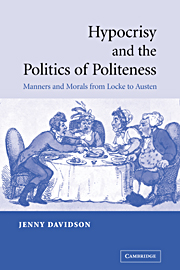Book contents
- Frontmatter
- Contents
- Acknowledgments
- Introduction: The revolution in manners in eighteenth-century prose
- 1 Hypocrisy and the servant problem
- 2 Gallantry, adultery and the principles of politeness
- 3 Revolutions in female manners
- 4 Hypocrisy and the novel I: Pamela, or Virtue Rewarded
- 5 Hypocrisy and the novel II: a modest question about Mansfield Park
- Coda: Politeness and its costs
- Notes
- Bibliography
- Index
5 - Hypocrisy and the novel II: a modest question about Mansfield Park
Published online by Cambridge University Press: 22 September 2009
- Frontmatter
- Contents
- Acknowledgments
- Introduction: The revolution in manners in eighteenth-century prose
- 1 Hypocrisy and the servant problem
- 2 Gallantry, adultery and the principles of politeness
- 3 Revolutions in female manners
- 4 Hypocrisy and the novel I: Pamela, or Virtue Rewarded
- 5 Hypocrisy and the novel II: a modest question about Mansfield Park
- Coda: Politeness and its costs
- Notes
- Bibliography
- Index
Summary
It is often asserted that Mansfield Park (1814) attacks theatricality and condemns insincerity, and the novel's goal is described by one critic as “[to establish], in the person of Fanny Price, a virtuous and immutable transparency.” The question asked here rests on a very different assumption about Mansfield Park: what if the novel represents Austen's most fully elaborated argument for hypocrisy? Ruth Bernard Yeazell has suggested that female modesty is necessarily hypocritical, its nature always to be at once a security for virtue and a technique of seduction. I hope to show that Fanny Price is hypocritical not just in this but in other important ways as well, and that her hypocrisy is central to the goals of Mansfield Park. In the modest figure of Fanny Price, I will argue, Austen defends those forms of insincerity that are produced by dependence.
As a heroine supposed to embody the moral argument of Mansfield Park, Fanny Price has elicited little affection from readers and critics. Lionel Trilling sets the tone with his well-known pronouncement: “Nobody, I believe, has ever found it possible to like the heroine of Mansfield Park.” Accounts of what makes Fanny Price unlikable differ, but it may have something to do with her inferiority. Avrom Fleishman attributes to Fanny the “moral aggressiveness” that is the submissive person's only way to express hostility towards those on whom she depends; Kingsley Amis describes Fanny as “a monster of complacency and pride … under a cloak of cringing self-abasement”; Claudia L. Johnson identifies Fanny as Mansfield Park's “most obsequious and most disastrously indoctrinated inmate.
- Type
- Chapter
- Information
- Hypocrisy and the Politics of PolitenessManners and Morals from Locke to Austen, pp. 146 - 169Publisher: Cambridge University PressPrint publication year: 2004

